-
 Bitcoin
Bitcoin $87,315.1852
3.56% -
 Ethereum
Ethereum $1,630.6745
3.43% -
 Tether USDt
Tether USDt $1.0000
-0.01% -
 XRP
XRP $2.1211
3.50% -
 BNB
BNB $601.3750
1.83% -
 Solana
Solana $139.4069
1.88% -
 USDC
USDC $1.0000
0.00% -
 Dogecoin
Dogecoin $0.1621
5.44% -
 TRON
TRON $0.2427
-1.07% -
 Cardano
Cardano $0.6408
4.12% -
 Chainlink
Chainlink $13.4721
4.10% -
 Avalanche
Avalanche $20.5905
6.44% -
 UNUS SED LEO
UNUS SED LEO $9.0293
-3.55% -
 Stellar
Stellar $0.2580
6.57% -
 Toncoin
Toncoin $3.0124
1.24% -
 Shiba Inu
Shiba Inu $0.0...01262
3.69% -
 Sui
Sui $2.2608
7.36% -
 Hedera
Hedera $0.1701
4.81% -
 Bitcoin Cash
Bitcoin Cash $340.3613
1.98% -
 Polkadot
Polkadot $3.9035
2.19% -
 Litecoin
Litecoin $80.3247
5.82% -
 Hyperliquid
Hyperliquid $17.9745
1.79% -
 Dai
Dai $1.0000
0.00% -
 Bitget Token
Bitget Token $4.4669
1.79% -
 Ethena USDe
Ethena USDe $0.9992
0.00% -
 Pi
Pi $0.6333
1.02% -
 Monero
Monero $215.0155
0.40% -
 Uniswap
Uniswap $5.4281
4.46% -
 Pepe
Pepe $0.0...07881
7.27% -
 Aptos
Aptos $5.1724
4.43%
What is a smart contract? How is it different from a traditional contract?
Smart contracts, first conceptualized by Nick Szabo in 1994, became possible with Ethereum's blockchain in 2015, automating and securing agreements without intermediaries.
Apr 11, 2025 at 07:21 pm
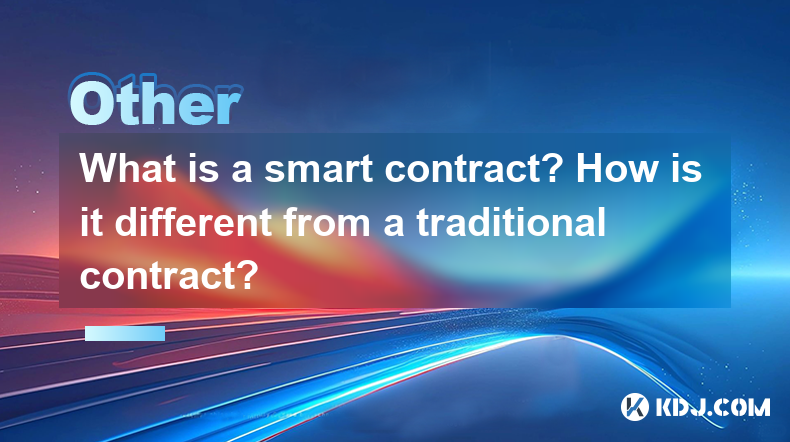
A smart contract is a self-executing contract with the terms of the agreement directly written into code. These contracts run on blockchain technology, ensuring transparency and security without the need for intermediaries. Unlike traditional contracts, smart contracts automatically enforce and execute the terms of the agreement, making them more efficient and less prone to disputes.
Smart contracts were first conceptualized by computer scientist Nick Szabo in 1994, long before the advent of blockchain technology. However, it was the emergence of blockchain, particularly with the launch of Ethereum in 2015, that provided the necessary infrastructure for smart contracts to become a reality. Ethereum's ability to execute code on its blockchain made it possible for developers to create and deploy smart contracts, revolutionizing how agreements are managed in the cryptocurrency world.
Key Features of Smart Contracts
Smart contracts come with several distinctive features that set them apart from traditional contracts. The most notable feature is their automation. Once the conditions of the contract are met, the smart contract automatically executes the agreed-upon actions without any human intervention. This automation reduces the need for intermediaries, such as lawyers or banks, thereby lowering costs and increasing efficiency.
Another significant feature is transparency. All participants in a smart contract can view the terms and conditions, as the contract is stored on a public blockchain. This transparency helps build trust among parties, as everyone can verify the terms and the execution of the contract.
Additionally, smart contracts are immutable. Once deployed on the blockchain, the terms of the contract cannot be altered. This immutability ensures that the contract's terms remain unchanged, providing a high level of security and reliability.
How Smart Contracts Work
To understand how smart contracts work, let's break down the process into its fundamental steps. When parties agree to the terms of a smart contract, the contract is written in a programming language, such as Solidity, which is specifically designed for creating smart contracts on the Ethereum blockchain.
The smart contract is then deployed onto the blockchain. This deployment involves sending the contract code to the blockchain network, where it is verified and added to the blockchain ledger. Once deployed, the smart contract has a unique address on the blockchain, which can be used to interact with it.
When the conditions specified in the smart contract are met, the contract automatically executes the agreed-upon actions. For example, if the smart contract is for a loan, once the borrower repays the loan, the smart contract automatically releases the collateral back to the borrower. This execution is transparent and verifiable by all parties involved.
Differences Between Smart Contracts and Traditional Contracts
Smart contracts differ from traditional contracts in several key ways. Firstly, smart contracts are digital and automated, while traditional contracts are often paper-based and require manual enforcement. This automation eliminates the need for intermediaries, making smart contracts more efficient and cost-effective.
Secondly, smart contracts are transparent and immutable. Traditional contracts can be altered or disputed, whereas smart contracts are stored on a blockchain, making them transparent to all parties and unchangeable once deployed. This transparency and immutability reduce the risk of fraud and disputes.
Thirdly, smart contracts are self-executing. Traditional contracts rely on third parties to enforce the terms, which can lead to delays and additional costs. Smart contracts, on the other hand, execute automatically when the conditions are met, ensuring that the terms are enforced without delay.
Examples of Smart Contract Use Cases
Smart contracts have a wide range of applications within the cryptocurrency and blockchain ecosystem. One common use case is decentralized finance (DeFi). In DeFi, smart contracts are used to create lending platforms, decentralized exchanges, and other financial services without the need for traditional financial institutions.
Another example is supply chain management. Smart contracts can be used to automate and track the movement of goods through a supply chain, ensuring that all parties adhere to the agreed-upon terms and conditions. This automation can improve efficiency and reduce the risk of fraud.
Smart contracts are also used in token sales and initial coin offerings (ICOs). These contracts automate the distribution of tokens to investors, ensuring that the terms of the sale are met and that the funds are released only when the conditions are satisfied.
Challenges and Limitations of Smart Contracts
Despite their numerous advantages, smart contracts face several challenges and limitations. One major challenge is code vulnerabilities. Since smart contracts are written in code, any errors or bugs can lead to unintended consequences. For example, the infamous DAO hack in 2016 was caused by a vulnerability in a smart contract, resulting in the theft of millions of dollars worth of Ethereum.
Another limitation is legal recognition. While smart contracts are widely used in the cryptocurrency world, their legal status in many jurisdictions remains unclear. This uncertainty can pose challenges when smart contracts need to interact with traditional legal systems.
Additionally, scalability is a concern. As the number of smart contracts on a blockchain increases, the network can become congested, leading to slower transaction times and higher fees. This scalability issue is a significant challenge for blockchain platforms that rely heavily on smart contracts.
FAQs
Q: Can smart contracts be used for any type of agreement?
A: While smart contracts are versatile, they are best suited for agreements that can be clearly defined in code and have objective conditions for execution. Complex agreements that require human judgment or subjective interpretation may not be suitable for smart contracts.
Q: Are smart contracts secure?
A: Smart contracts can be secure if they are well-coded and thoroughly tested. However, vulnerabilities in the code can lead to security breaches. It's essential for developers to follow best practices and for users to audit smart contracts before interacting with them.
Q: How can I create a smart contract?
A: To create a smart contract, you need to have programming skills, particularly in languages like Solidity for Ethereum. You can write the contract, test it on a testnet, and then deploy it on the mainnet. There are also platforms and tools available that can help you create smart contracts without extensive coding knowledge.
Q: What happens if there's a dispute over a smart contract?
A: Since smart contracts are immutable, resolving disputes can be challenging. Some blockchain platforms have mechanisms for dispute resolution, such as arbitration services or decentralized courts. However, the effectiveness of these mechanisms can vary, and in some cases, disputes may need to be resolved through traditional legal channels.
Disclaimer:info@kdj.com
The information provided is not trading advice. kdj.com does not assume any responsibility for any investments made based on the information provided in this article. Cryptocurrencies are highly volatile and it is highly recommended that you invest with caution after thorough research!
If you believe that the content used on this website infringes your copyright, please contact us immediately (info@kdj.com) and we will delete it promptly.
- Ethereum (ETH) Attempts a Comeback as Key Resistance Nears
- 2025-04-21 20:00:20
- Bitcoin Did Not Have the Explosive Start Many Expected
- 2025-04-21 20:00:20
- Bitcoin (BTC) Surges to New All-Time Highs as Gold Market Invests Flock to Safe-Haven Assets
- 2025-04-21 19:55:13
- AI Trading Agents Are Disrupting the Financial Services Industry
- 2025-04-21 19:55:13
- 4 Crypto Coins to Watch That Are Rewriting the Rules
- 2025-04-21 19:50:12
- President Donald Trump's threat to terminate Federal Reserve Chairman Jerome Powell
- 2025-04-21 19:50:12
Related knowledge
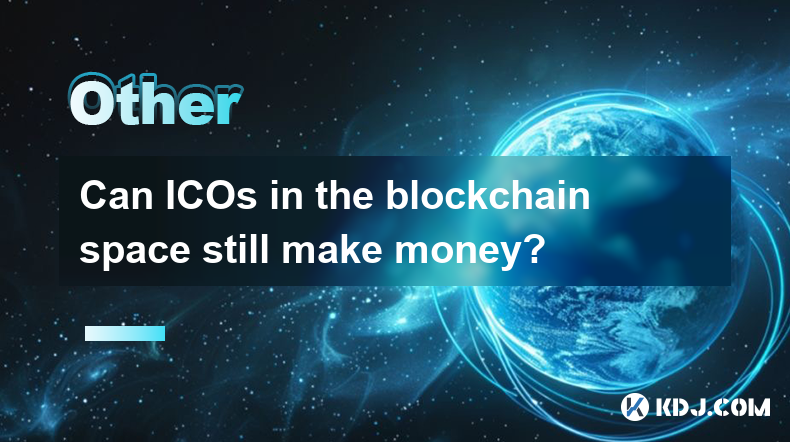
Can ICOs in the blockchain space still make money?
Apr 17,2025 at 08:29pm
The landscape of Initial Coin Offerings (ICOs) in the blockchain space has evolved significantly since their peak in 2017 and 2018. Despite the increased regulatory scrutiny and the rise of alternative fundraising methods like Security Token Offerings (STOs) and Initial Exchange Offerings (IEOs), ICOs can still be a viable way to raise funds and generat...
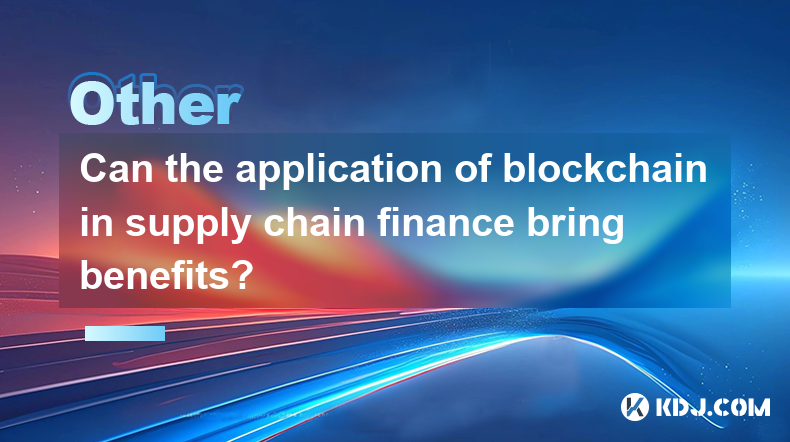
Can the application of blockchain in supply chain finance bring benefits?
Apr 15,2025 at 04:00pm
Can the application of blockchain in supply chain finance bring benefits? The integration of blockchain technology into supply chain finance has garnered significant attention in the cryptocurrency and financial sectors. This article explores how blockchain can potentially revolutionize supply chain finance, detailing its benefits and providing a compre...

Does the ranking of Chinese blockchain apps include cross-chain applications?
Apr 14,2025 at 04:00pm
The ranking of Chinese blockchain apps is a comprehensive evaluation that takes into account various aspects such as user base, transaction volume, and technological innovation. A pertinent question arises regarding whether these rankings include cross-chain applications. Cross-chain applications, which allow different blockchain networks to interact an...
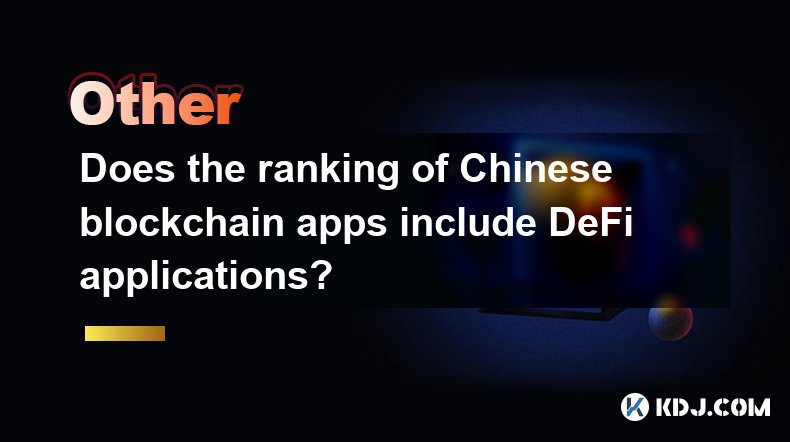
Does the ranking of Chinese blockchain apps include DeFi applications?
Apr 15,2025 at 06:57am
The ranking of Chinese blockchain apps is a comprehensive list that showcases the most popular and influential applications within the cryptocurrency ecosystem. One question that often arises is whether these rankings include DeFi applications. To answer this, we need to delve into the specifics of how these rankings are compiled and what types of appli...
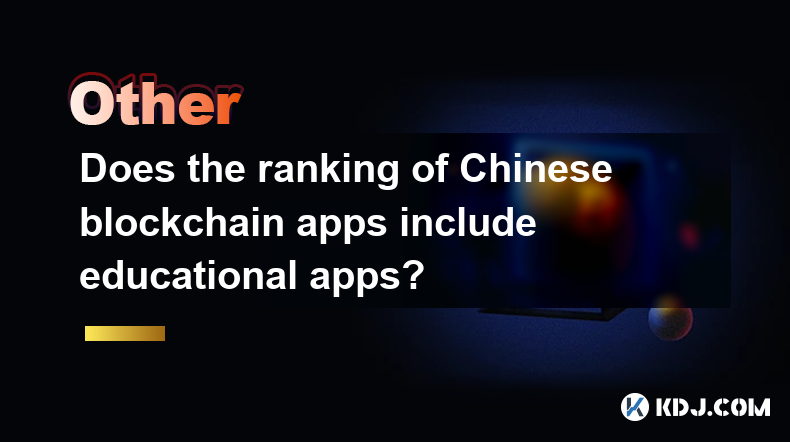
Does the ranking of Chinese blockchain apps include educational apps?
Apr 16,2025 at 03:35am
The ranking of Chinese blockchain apps often includes a variety of categories, from finance and gaming to social networking and beyond. One question that frequently arises is whether these rankings include educational apps. To address this, we need to delve into the specifics of how blockchain apps are categorized and ranked in China, and whether educat...
Does the ranking of Chinese blockchain apps include enterprise-level applications?
Apr 15,2025 at 06:42am
The ranking of Chinese blockchain apps often includes a variety of applications, ranging from consumer-focused to enterprise-level solutions. Understanding the scope and criteria for these rankings is essential to determine if enterprise-level applications are included. This article delves into the specifics of how Chinese blockchain app rankings are co...

Can ICOs in the blockchain space still make money?
Apr 17,2025 at 08:29pm
The landscape of Initial Coin Offerings (ICOs) in the blockchain space has evolved significantly since their peak in 2017 and 2018. Despite the increased regulatory scrutiny and the rise of alternative fundraising methods like Security Token Offerings (STOs) and Initial Exchange Offerings (IEOs), ICOs can still be a viable way to raise funds and generat...

Can the application of blockchain in supply chain finance bring benefits?
Apr 15,2025 at 04:00pm
Can the application of blockchain in supply chain finance bring benefits? The integration of blockchain technology into supply chain finance has garnered significant attention in the cryptocurrency and financial sectors. This article explores how blockchain can potentially revolutionize supply chain finance, detailing its benefits and providing a compre...

Does the ranking of Chinese blockchain apps include cross-chain applications?
Apr 14,2025 at 04:00pm
The ranking of Chinese blockchain apps is a comprehensive evaluation that takes into account various aspects such as user base, transaction volume, and technological innovation. A pertinent question arises regarding whether these rankings include cross-chain applications. Cross-chain applications, which allow different blockchain networks to interact an...

Does the ranking of Chinese blockchain apps include DeFi applications?
Apr 15,2025 at 06:57am
The ranking of Chinese blockchain apps is a comprehensive list that showcases the most popular and influential applications within the cryptocurrency ecosystem. One question that often arises is whether these rankings include DeFi applications. To answer this, we need to delve into the specifics of how these rankings are compiled and what types of appli...

Does the ranking of Chinese blockchain apps include educational apps?
Apr 16,2025 at 03:35am
The ranking of Chinese blockchain apps often includes a variety of categories, from finance and gaming to social networking and beyond. One question that frequently arises is whether these rankings include educational apps. To address this, we need to delve into the specifics of how blockchain apps are categorized and ranked in China, and whether educat...

Does the ranking of Chinese blockchain apps include enterprise-level applications?
Apr 15,2025 at 06:42am
The ranking of Chinese blockchain apps often includes a variety of applications, ranging from consumer-focused to enterprise-level solutions. Understanding the scope and criteria for these rankings is essential to determine if enterprise-level applications are included. This article delves into the specifics of how Chinese blockchain app rankings are co...
See all articles






















































































